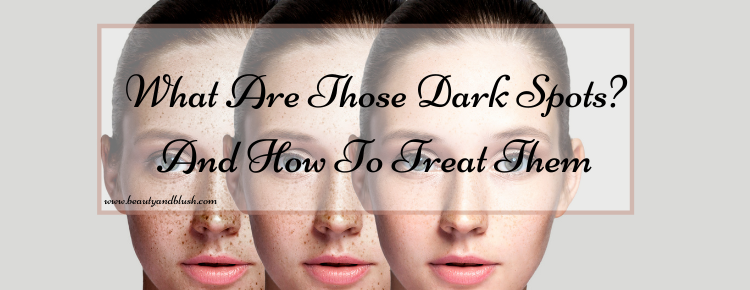What Are Those Dark Spots? And How To Treat Them
Hello Everyone,
Whether you’ve had darker spots on your skin for a while or you just started developing them, you might worry about your complexion. Don’t fret — dark spots are usually nothing to worry about. However, that may be partial consolation if you feel self-conscious about them.
Different from moles or freckles, dark spots are called hyperpigmentation. Hyperpigmentation is a common skin condition that can make some areas (or patches) of your skin darker. The term refers to the development of extra melanin or pigment in your skin.
Let’s find out more about hyperpigmentation.
Three Common Types of Hyperpigmentation
There are three common types of hyperpigmentation:
-
Melasma:
Experts believe that melasma results from hormone changes and frequently develops during women’s pregnancies. Melasma can occur anywhere on the body, but women most commonly develop it on their stomachs or faces.
-
Post-inflammatory Hyperpigmentation:
This skin darkening condition relates to injury or inflammation of the skin. Burns and acne are the most common culprits.
-
Liver Spots or Sunspots:
Sometimes also called solar lentigines, sunspots are among the most common forms of this skin condition. You might have already guessed, but they are typically the result of excess sun exposure over time. People often find them on their faces and hands as they get into their 30s and 40s.
Who Is Most Affected By Hyperpigmentation?
The types of hyperpigmentation provide some hints as to who is most affected, but let’s look closer:
- People of color are subject to dark spots because their skin already contains more melanin.
- People who are aging often develop sunspots or liver spots.
- Women in their childbearing years during hormonal changes may develop hyperpigmentation.
- People with certain skin disorders are susceptible to dark spots.
- People who are taking medication, such as oral contraceptives, may develop hyperpigmentation.
Tips to Prevent and Manage Your Skin’s Dark Spots
There are some steps you can take to prevent, manage, reduce or remove dark spots from your skin. Here are a few:
- Visit a skin and laser center to schedule a procedure that can repair damage from sun exposure, including freckles, age spots and more.
- Spend less time in direct sunlight. For the times you can’t resist the great outdoors, wear SPF 30 sunscreen or greater.
- Avoid picking at your skin if you have acne.
Thankfully, dark spots are usually harmless. Follow the tips above to help you feel less self-conscious and embrace all the great things about your appearance. For more information, check out the accompanying resource by Zapatat.
This infographic was created by Zapatat, anti aging laser treatment provider
